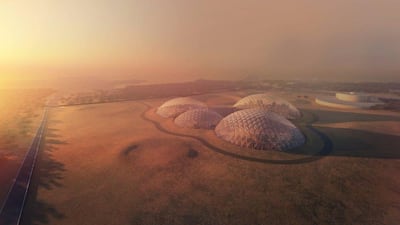Construction of the world’s largest Mars simulation city is to begin in the Dubai desert next year, with completion and the start of operations scheduled for 2024.
The Dh500 million ($136.1m) Mars Science City was announced in 2017 but has been stuck in the design phase since, because officials at Mohammed bin Rashid Space Centre had yet to secure land that would allow for expansion.
The city was initially to be built next to MBRSC in Al Khawaneej, but Academic City has now been chosen as the site.
One architects’ practice bidding to design the complex suggested it could occupy about 176,156 square metres, bigger than 24 football pitches.
The centre will simulate the environment of Mars, with pressurised biodomes and robotics labs. The project is part of the Mars 2117 initiative to build a city on the Red Planet by the year 2117.
Adnan Al Rais, the Mars 2117 project manager, told The National that the new location offered long-term flexibility.
“At the beginning we had a piece of land that was dedicated to the Mars Science City, but because Dubai is growing and the new urban planning of the Dubai government, that location near MBRSC is not suitable any more. It’s becoming a residential area and it wouldn’t allow expansion,” he said.
“The new location is Academic City. That’s a better area and it’s closer to universities and different institutions.”
For the past 18 months, Mr Al Rais and his team have been working to identify the requirements of the city and now a design consultant will be hired to create the layout of the project.
A model for living on Mars

Mr Al Rais said the city would include several features that would allow scientists from all over the world to carry out research related to the red planet.
“The Mars Science City will be a platform where we’re going to have our future space robotics lab, future analog facilities, a habitat and a space sustainability lab,” he said.
“We’re currently working on the design. Then we’ll do the construction for the next two years. Hopefully, the city will be ready and operational towards the end of 2024.
“We are also working with our partners for identifying the requirements for unique analog facilities as part of the Mars Science City.”
An analogue facility is a simulation of the harsh space-like environment, where humans live in isolation for several weeks or months to prepare for future space exploration missions.
As part of a different project, MBRSC has shortlisted two Emirati candidates who will travel to Russia at the end of this year to live in a Mars analogue facility for eight months.
If analogue facilities are built in Mars Science City, it would give Emirati astronauts easier access to training in such simulated environments.
Mr Al Rais said an architect has not yet been selected for the city, but there have been proposals.
Architects Bjarke Ingels Group proposed 3D underground buildings and recommended solar energy to power and heat the city.
As part of the UAE’s Mars programme, MBRSC also sent the Hope probe into space, to orbit around the Red Planet. The robotic craft is currently capturing scientific data about the planet’s upper and lower atmosphere.














